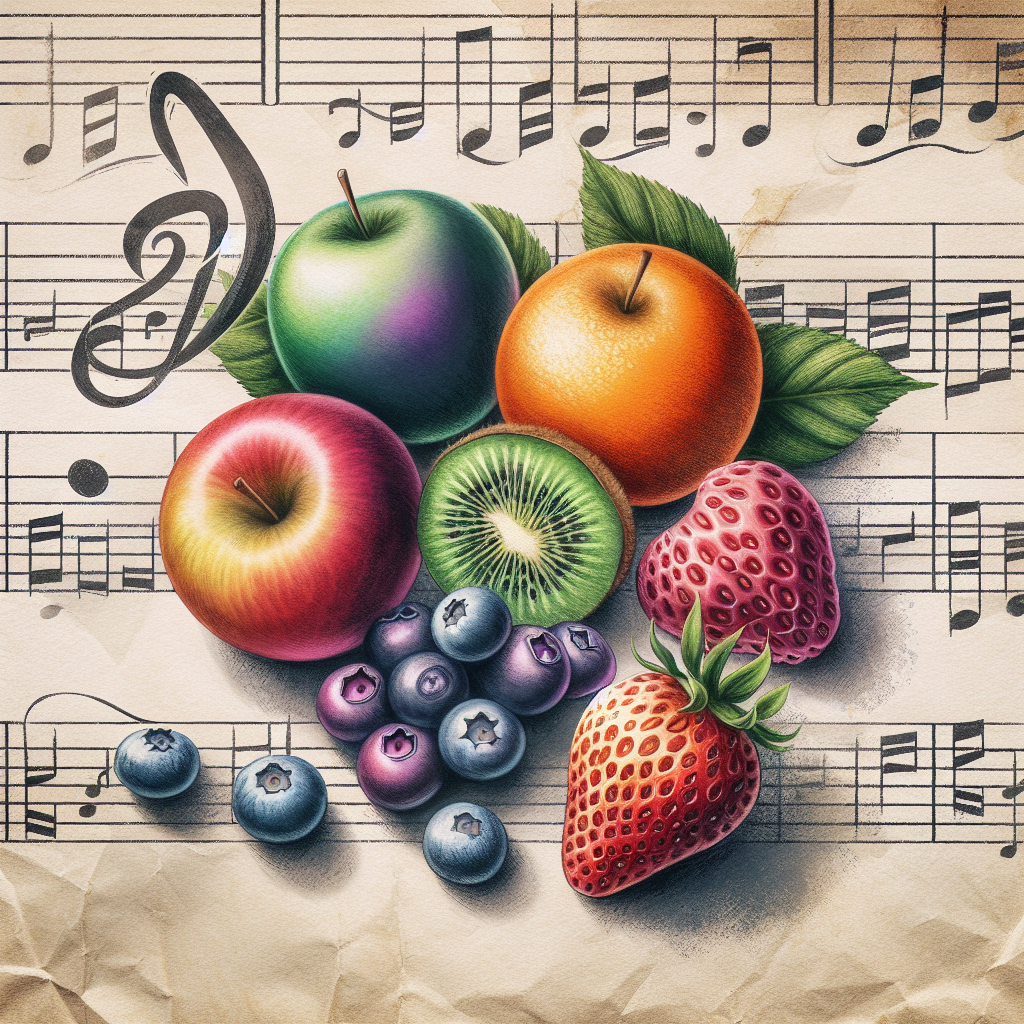The Connection Between Music and Vitamin Intake

Discover the fascinating connection between music and vitamin intake! Uncover how these two seemingly unrelated elements can impact your health and well-being. Learn more and enhance your vitality today. Click here to explore.
Exploring the Link Between Music Therapy and Vitamin Absorption
Music has long been recognized for its therapeutic benefits, offering a soothing balm for the mind and soul. However, recent studies suggest that the healing power of music may extend beyond the psychological realm, potentially influencing physical health in surprising ways. One such area of interest is the connection between music and vitamin intake, specifically the role of music therapy in enhancing vitamin absorption.
Music therapy, a burgeoning field in healthcare, uses music interventions to address physical, emotional, cognitive, and social needs of individuals. It has been found to be effective in managing stress, improving memory, and promoting overall well-being. But could it also play a role in how our bodies absorb vitamins?
Vitamins are essential nutrients that our bodies need in small amounts to work properly. They are crucial for various bodily functions, including growth, digestion, and nerve function. Our bodies get these vitamins from the foods we eat. However, the process of absorbing these vitamins is complex and can be influenced by various factors, including stress levels, gut health, and even the sounds we are exposed to.
Emerging research suggests that music, with its unique ability to influence our mood and stress levels, could potentially enhance our body’s ability to absorb vitamins. The theory is that music, particularly calming and soothing tunes, can help reduce stress and promote relaxation. This, in turn, can improve gut health and create an optimal environment for vitamin absorption.
A study conducted by the University of Maryland Medical Center found that listening to joyful music has a healthy effect on blood vessel function. The researchers found that the emotions aroused by joyful music have a healthy effect on blood vessel function, expanding blood vessels and increasing blood flow. This improved blood flow could potentially enhance nutrient absorption, including vitamins.
Moreover, music therapy has been found to have a positive impact on mental health, which could indirectly influence vitamin absorption. Stress and anxiety can negatively affect digestion and nutrient absorption. By reducing stress levels, music therapy could potentially improve digestion and enhance the body’s ability to absorb vitamins.
However, it’s important to note that while these findings are promising, more research is needed to fully understand the connection between music therapy and vitamin absorption. The complexity of the human body and the myriad factors that influence nutrient absorption mean that it’s unlikely that music alone can significantly boost vitamin absorption. Nevertheless, these studies highlight the potential of music therapy as a complementary approach to improving overall health.
In conclusion, the connection between music and vitamin intake is a fascinating area of study that offers promising insights into the potential health benefits of music therapy. While more research is needed, the existing studies suggest that music, with its ability to reduce stress and improve mood, could potentially enhance our body’s ability to absorb essential vitamins. So, the next time you’re enjoying your favorite tunes, remember that you might be doing more than just lifting your spirits – you could also be giving your body a vitamin boost.
The Impact of Music on Vitamin Intake and Overall Health

Music has long been recognized for its therapeutic properties, with its ability to uplift moods, reduce stress, and even improve cognitive function. However, recent studies have begun to explore a fascinating new dimension of music’s influence on our lives: its potential impact on vitamin intake and overall health.
The connection between music and vitamin intake may seem far-fetched at first glance, but it is grounded in the science of how our bodies respond to different stimuli. Music, as a form of sensory stimulation, can influence our physiological responses, including appetite and digestion. This, in turn, can affect our nutrient absorption, including vitamins.
One of the key ways in which music can influence vitamin intake is through its impact on stress levels. Chronic stress can have a detrimental effect on our bodies, including impairing our digestive system’s ability to absorb nutrients effectively. By reducing stress, music can help to improve our body’s ability to absorb vitamins from the food we eat.
Moreover, music can also influence our eating habits. A study published in the journal “Appetite” found that listening to soft, slow music can lead to a decrease in food intake, while fast, loud music can increase it. This suggests that the type of music we listen to while eating can influence not only how much we eat, but also the pace at which we eat. Eating at a slower pace has been linked to better digestion and nutrient absorption, including vitamins.
In addition to influencing vitamin intake, music can also have a direct impact on our overall health. For instance, music therapy has been found to be effective in managing a range of health conditions, from anxiety and depression to chronic pain and sleep disorders. Music can also boost our immune system by increasing the production of antibodies and activating the cells that attack viruses and boost immunity.
Furthermore, music can stimulate the production of endorphins, the body’s natural painkillers, and serotonin, a neurotransmitter that contributes to feelings of well-being and happiness. These biochemical effects of music can contribute to improved mental health, which is closely linked to physical health.
However, it’s important to note that while music can have a positive impact on vitamin intake and overall health, it is not a substitute for a balanced diet and regular exercise. The best way to ensure adequate vitamin intake is to consume a variety of nutrient-rich foods, including fruits, vegetables, whole grains, lean proteins, and healthy fats. Regular physical activity is also crucial for maintaining good health.
In conclusion, the connection between music and vitamin intake is a fascinating area of research that offers new insights into the myriad ways in which music can influence our health. By reducing stress, influencing our eating habits, and having a direct impact on our physical and mental health, music can play a significant role in promoting better vitamin absorption and overall well-being. However, it’s important to remember that music is just one piece of the puzzle when it comes to maintaining good health. A balanced diet, regular exercise, and a healthy lifestyle are also crucial.
Harmonizing Health: The Surprising Connection Between Music and Vitamin Intake
Music has long been recognized as a powerful tool for healing and wellness. Its ability to soothe the mind, uplift the spirit, and even stimulate physical healing is well-documented. However, a surprising connection has recently been discovered that adds another dimension to the therapeutic potential of music: its relationship with vitamin intake.
The connection between music and vitamin intake may seem far-fetched at first glance. After all, what could a sensory experience like listening to music possibly have to do with the nutrients we consume? The answer lies in the intricate interplay between our physiological and psychological responses to both music and vitamins.
Research has shown that music can influence our mood and emotions, which in turn can affect our eating habits. For instance, listening to calming music can reduce stress and anxiety, which are known triggers for unhealthy eating behaviors such as overeating or consuming nutrient-poor foods. By helping to regulate our emotional state, music can indirectly promote healthier eating patterns, which can lead to improved vitamin intake.
Moreover, certain types of music have been found to stimulate the production of specific hormones and neurotransmitters that play a role in nutrient absorption. For example, music that elicits feelings of happiness can boost the production of serotonin, a neurotransmitter that aids in the absorption of vitamins and minerals in the gut. This suggests that the positive emotional response elicited by music can enhance our body’s ability to absorb the nutrients we consume, including vitamins.
On the other hand, vitamins can also influence our response to music. Vitamins, particularly the B-complex vitamins, are essential for the proper functioning of our nervous system, including our auditory system. Deficiencies in these vitamins can impair our ability to perceive and process auditory stimuli, including music. Therefore, maintaining adequate vitamin intake can enhance our auditory sensitivity and our overall music experience.
Furthermore, certain vitamins, such as vitamin D, are known to support mood regulation and cognitive function. These are key factors in our emotional and psychological response to music. By ensuring adequate intake of these vitamins, we can potentially enhance our emotional engagement with music and reap more of its therapeutic benefits.
The connection between music and vitamin intake is a fascinating area of research that is still in its early stages. However, the findings so far suggest that music and vitamins can work in harmony to promote our overall health and well-being. By integrating music into our daily routine and ensuring adequate vitamin intake, we can potentially enhance both our physical and mental health.
In conclusion, the connection between music and vitamin intake underscores the holistic nature of health. It reminds us that our physical and mental health are interconnected and that various aspects of our lifestyle, including our diet and our engagement with music, can influence our overall well-being. As we continue to explore this connection, we may discover new ways to harness the power of music and vitamins to promote health and wellness.